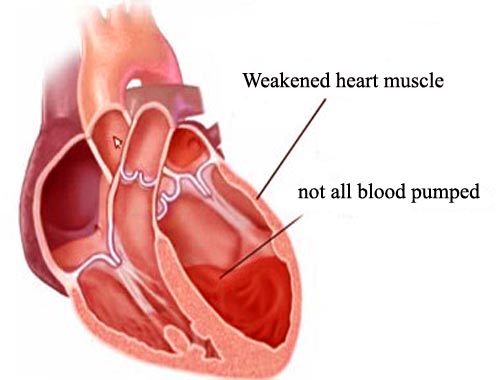Cardiomyopathy
Cardiomyopathy is disease that damages the heart muscles and leads to heart failure. There are several different types. Injury to the heart muscles may cause the heart muscles to thin out (dilate) or become too thick (become hypertrophic). In either case, the heart doesn't pump correctly. Viral myocarditis is a rare viral infection that involves the heart muscle and can produce either temporary or permanent heart muscle damage; Dilated Cardiomyopathy. Dilated cardiomyopathy involves an enlarged heart ventricle. The muscles thin out, reducing the pumping action, usually on the left side. Although this condition is associated with genetic factors, the direct cause often is not known. (This is called idiopathic dilated cardiomyopathy.) Research strongly indicates that viruses, such as Coxsackie virus, or other infections may be at the base of this condition. Researchers think that an autoimmune response occurs in which infection-fighting antibodies attack a person's own proteins in the heart, mistaking them for foreign substances. Chronic alcohol abuse can damage the heart muscles, can cause hypertension, and may be one cause of idiopathic dilated cardiomyopathy. Moderate alcohol consumption, on the other hand (generally defined as 2 drinks a day for men and 1 drink for women), may protect against heart failure. Non-drinkers, though, are not advised to begin drinking; Hypertrophic Cardiomyopathy. In hypertrophic cardiomyopathy, the heart muscles become thick and contract with difficulty. Some research indicates that this occurs because of a genetic defect that causes a loss of power in heart muscle cells and, subsequently, lower pumping strength. To compensate for this power loss, the heart muscle cells grow. This condition, rare in the general population, is often the cause of sudden death in young athletes; Restrictive Cardiomyopathy. Restrictive cardiomyopathy refers to a group of disorders in which the heart chambers are unable to properly fill with blood because of stiffness in the heart. The heart is of normal size or only slightly enlarged. However, it cannot relax normally during the time between heartbeats when the blood returns from the body to the heart (diastole). The most common causes of restrictive cardiomyopathy are amyloidosis and scarring of the heart from an unknown cause (idiopathic myocardial fibrosis). It frequently occurs after a heart transplant. It is important to recognize that the traditional classification into hypertrophic, dilated, and restrictive cardiomyopathies mixes anatomical with functional designations, which are not mutually exclusive.
